
Review of Socionetwork Strategies
Scope & Guideline
Pioneering Theoretical Insights into Social Structures
Introduction
Aims and Scopes
- Social Network Analysis (SNA):
The journal emphasizes the use of social network analysis techniques to understand relationships and interactions within various domains, including business, law, and technology. - Application of Artificial Intelligence (AI) and Machine Learning (ML):
A consistent focus on the integration of AI and ML methodologies to enhance decision-making processes, predictive analytics, and automation in social network contexts. - Legal and Ethical Implications of Technology:
Exploration of the legal frameworks surrounding emerging technologies, particularly in relation to data privacy, AI ethics, and regulatory compliance. - Consumer Behavior and Marketing Strategies:
Research into how social networks influence consumer purchasing behavior, brand loyalty, and marketing effectiveness, particularly in digital and live-streaming contexts. - Interdisciplinary Approaches:
Encouragement of interdisciplinary research that combines insights from sociology, economics, information technology, and behavioral sciences to address complex social phenomena. - Crisis Management and Risk Assessment:
Analysis of social networks in the context of crisis management, including the identification of risks and the development of strategies for mitigating impacts on businesses and communities.
Trending and Emerging
- Integration of AI in Various Domains:
There is a significant increase in research exploring the application of AI across different fields, including legal information processing, marketing, and organizational behavior, reflecting the growing importance of intelligent systems. - Impact of COVID-19 on Social Dynamics:
Research examining the effects of the COVID-19 pandemic on consumer behavior, telework, and organizational change is on the rise, showcasing the journal's responsiveness to current global challenges. - Legal and Ethical Considerations of AI:
A growing focus on the implications of AI technologies in legal contexts, including discussions on compliance, ethical frameworks, and the role of regulatory sandboxes. - Real-Time Data Utilization:
Emerging themes around the use of real-time data analytics for decision-making in diverse contexts, such as supermarkets and supply chains, indicate a trend towards immediacy in data-driven strategies. - Social Media Influence on Behavior:
Increasing attention to how social media platforms shape consumer intentions and behaviors, particularly in areas such as travel and online purchasing, illustrating the relevance of social media dynamics.
Declining or Waning
- Traditional Marketing Techniques:
There appears to be a decreasing emphasis on conventional marketing strategies, with a shift towards more innovative, data-driven approaches that leverage social network insights. - Basic Statistical Methods:
The use of basic statistical methods for data analysis is becoming less prevalent as researchers increasingly adopt advanced machine learning and AI techniques for deeper insights. - Generalized Theoretical Frameworks:
There is a decline in papers focused on broad theoretical frameworks without empirical application, as the journal favors studies with practical implications and real-world applications. - Niche Subjects in Social Network Theory:
Certain niche areas within social network theory that previously garnered attention are fading, as the focus shifts towards more applied research that connects network theory with pressing contemporary issues. - Local Case Studies:
Research focusing solely on localized case studies without broader applicability is becoming less frequent, as there is a growing preference for studies with international or cross-cultural relevance.
Similar Journals
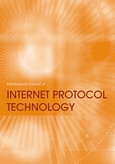
International Journal of Internet Protocol Technology
Unveiling Trends in Protocol DevelopmentThe International Journal of Internet Protocol Technology (ISSN: 1743-8209; E-ISSN: 1743-8217), published by InderScience Enterprises Ltd, is an esteemed periodical dedicated to advancing research in the realms of internet protocols and communication technologies. Established in 2005 and headquartered in the United Kingdom, this journal serves as a vital platform for scholars and professionals, providing insights into innovative approaches and emerging trends within the field. With a 2023 Scopus ranking placing it in the Q4 category for Computer Networks and Communications, it continues to contribute to an evolving digital ecosystem. Although the journal does not offer open access, its articles are accessible through institutional subscriptions and provide a wealth of knowledge that aids the understanding and development of internet protocols. Researchers, practitioners, and students will find a range of high-quality studies that explore critical issues and technological advancements shaping global digital communications.
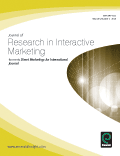
Journal of Research in Interactive Marketing
Exploring the Future of Consumer EngagementJournal of Research in Interactive Marketing, published by Emerald Group Publishing Ltd, stands as a premier outlet for scholarly research within the dynamic field of marketing, specifically focusing on the intersection of technology and consumer behavior. With an impressive 2023 Scopus ranking placing it in the Q1 category of Marketing, and an elite percentile of 95th among its peers, this journal is dedicated to advancing the theoretical and practical understanding of interactive marketing. The journal covers a wide array of topics that include digital marketing trends, consumer engagement strategies, and the impact of social media on marketing effectiveness, consistently attracting high-quality submissions from researchers and professionals alike. Operating since 2010, it continues to reflect the evolving landscape of marketing practices and technology, making it a vital resource for scholars and industry leaders seeking to enhance their knowledge and strategies in this fast-paced sector. While not open access, the journal ensures that its content remains relevant and accessible to those at the forefront of marketing innovation and research.
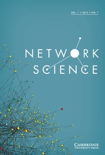
Network Science
Fostering collaboration through groundbreaking network research.Network Science is a distinguished journal published by Cambridge University Press, dedicated to advancing our understanding of complex networks across various domains, including communication, sociology, and psychology. Since its inception in 2013, the journal has consistently aimed to provide a platform for groundbreaking research that explores the structure and dynamics of networks, thereby facilitating interdisciplinary collaboration and innovation. With an impressive ranking in the Q2 category for Communication and Sociology, and Q3 for Social Psychology, Network Science has carved out a significant niche within the academic community, reflected in its reputable metrics—ranking #112 out of 511 in Communication and #333 out of 1466 in Sociology and Political Science according to Scopus. The journal plays a pivotal role in shaping the landscape of network theory and analysis, making it an essential resource for researchers, practitioners, and students eager to delve into the intricate relationships that underpin social systems. Access to this journal fosters an environment of scholarly exchange and stimulates further research in the rapidly evolving field of network studies.
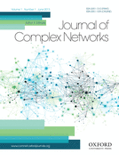
Journal of Complex Networks
Unraveling the Complexity of Mathematical InteractionsJournal of Complex Networks, published by Oxford University Press, stands as a prominent platform in the fields of Applied Mathematics, Computational Mathematics, and Computer Networks and Communications. Since its inception in 2013, this esteemed journal has garnered a strong reputation, achieving a Q2 category ranking across multiple disciplines in 2023, indicating its influence and quality in the relevant academic circles. With an ISSN of 2051-1310 and E-ISSN 2051-1329, it aims to facilitate the understanding of intricate network systems and their applications, positioning itself at the forefront of cutting-edge research. While the journal currently does not offer Open Access options, it remains a vital resource for researchers, professionals, and students seeking insights into the dynamic interplay between networks and computational methodologies. Its commitment to promoting rigorous research is reflected in its impressive Scopus rankings, which highlight its intersectional impact on various mathematical and computational disciplines. Contributing to this journal provides authors with an opportunity to engage with a broad audience dedicated to advancing knowledge in complex networks, optimization, and management science.
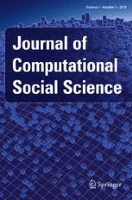
Journal of Computational Social Science
Innovating Solutions for Complex Social ChallengesThe Journal of Computational Social Science, published by SpringerNature, is a premier platform for interdisciplinary research at the intersection of social sciences and computational techniques. Since its inception in 2018, this open-access journal has garnered attention for its robust contributions to the fields of Artificial Intelligence and Transportation, holding a distinguished Q2 ranking in both categories as of 2023. Situated in Singapore, the journal embraces a wide scope aimed at exploring innovative applications of computational methods to address complex social phenomena, making it an essential resource for researchers, professionals, and students alike. With a growing impact and recognition—reflected by its Scopus rankings, notably at the 47th percentile in Transportation and 63rd in Artificial Intelligence—the Journal of Computational Social Science is dedicated to facilitating knowledge exchange and fostering collaboration in an era where technology increasingly informs social dynamics. Access to cutting-edge research in this field is vital for enriching scholarly discourse and advancing practical solutions to contemporary challenges.

JOURNAL OF INTELLIGENT INFORMATION SYSTEMS
Advancing the Frontiers of Intelligent SystemsThe Journal of Intelligent Information Systems, published by Springer since 1992, is a premier academic journal that offers a multidisciplinary platform in the fields of Artificial Intelligence, Computer Networks and Communications, Hardware and Architecture, Information Systems, and Software. With an impressive impact reflected in its 2023 Q2 category rankings across multiple domains and a commendable standing in the Scopus Rankings—ranking #84 in Computer Networks and Communications and #101 in Artificial Intelligence—the journal is recognized for its contribution to advancing knowledge and innovation. Although it is not an open-access journal, its accessibility through institutional subscriptions ensures that a wide range of researchers, professionals, and students can engage with high-quality, peer-reviewed research that addresses the latest advancements and trends in intelligent systems. For over three decades, this journal has effectively bridged gaps between academia and industry, making it a vital resource for those aiming to push boundaries in intelligent information systems.

EPJ Data Science
Exploring New Horizons in Modeling and SimulationEPJ Data Science is a prominent open-access journal affiliated with SPRINGER, dedicated to disseminating high-quality research in the fields of Computational Mathematics, Computer Science Applications, and Modeling and Simulation. Established in 2012, this journal provides a scholarly platform for innovative ideas and methodologies aimed at advancing data science, bridging gaps between theoretical foundations and practical applications. With impressive rankings, including Q1 in Modeling and Simulation and Q2 in both Computational Mathematics and Computer Science Applications as of 2023, EPJ Data Science is recognized for its significant contributions to academia, evidenced by its strong performance in Scopus rankings. The journal is committed to open access, ensuring that research is accessible to a global audience, thereby enhancing collaboration and interdisciplinary communication. Located at One New York Plaza, Suite 4600, New York, NY 10004, United States, it serves as a hub for researchers, professionals, and students eager to share and explore pioneering developments in data science.

Network Neuroscience
Connecting the Dots of Cognitive Science and TechnologyNetwork Neuroscience is a premier open-access journal published by MIT Press, focusing on the interdisciplinary nexus of neuroscience, applied mathematics, artificial intelligence, and computer science. Since its inception in 2017, the journal has established itself as a leading outlet for innovative research and cutting-edge methodologies, ensuring disseminated knowledge is freely accessible to all. With an impressive Q1 ranking in multiple categories including Applied Mathematics, Artificial Intelligence, Computer Science Applications, and Neuroscience, it serves as a vital platform for scholars, professionals, and students to explore the intricate networks that underpin cognitive processes and brain function. The journal is committed to advancing the understanding of complex neural mechanisms through interdisciplinary approaches and remains a crucial resource for anyone engaged in the burgeoning fields of network science and neuroscience research.

KNOWLEDGE AND INFORMATION SYSTEMS
Exploring the Intersection of Knowledge and TechnologyKNOWLEDGE AND INFORMATION SYSTEMS, published by SPRINGER LONDON LTD, is a distinguished journal in the field of information systems, artificial intelligence, and human-computer interaction. With its ISSN 0219-1377 and E-ISSN 0219-3116, this journal has built a robust reputation since its inception, featuring a convergence of valuable research from 2005 through 2024. Catering to a diverse academic audience, it is classified among the leading journals in its category, proudly holding a Q1 ranking in Information Systems and Q2 rankings in multiple other domains. The journal aims to publish cutting-edge research that not only advances theoretical understanding but also provides practical applications within these rapidly evolving fields. Although it is not an Open Access journal, subscribers can access a wealth of knowledge critical for researchers, practitioners, and students looking to enhance their expertise. With a 2023 Scopus rank placing it within the 66th percentile for Information Systems, KNOWLEDGE AND INFORMATION SYSTEMS is an invaluable resource for those committed to pushing the frontiers of knowledge in technology and information science.

International Journal of Marketing Communication and New Media
Advancing marketing communication through innovative research.Welcome to the International Journal of Marketing Communication and New Media, a premier platform dedicated to advancing the field of marketing communication in the rapidly evolving digital landscape. Published by the esteemed INST SUPERIOR ENTRE DOURO & VOUGA in Portugal, this journal facilitates an invaluable exchange of research and insights among scholars, practitioners, and students. With an ISSN of 2182-9306, it aims to explore innovative marketing communication strategies and new media applications, making a significant impact in the realms of advertising, public relations, and digital marketing. Although the journal operates under a subscription model, it remains committed to disseminating high-quality, peer-reviewed research that reflects current trends and challenges in the marketing industry. By contributing to this journal, you will join a vibrant community of thought leaders dedicated to shaping the future of marketing communication.